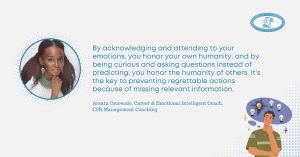
Emotional Intelligence for Leaders
From giving you the critical skill of self-awareness to becoming a high-value asset, here are nine answers to the question, “What are some of the most impactful ways that emotional intelligence affects success for leaders?”
· Gives You Self-Awareness
· Shifts Emotion and Thought Patterns
· Hands You the Key to True Leadership
· Grows Your Influence
· Helps Make Sense of Communication
· Creates Essential “Bootcamp Moments”
· Provides Psychological Safety
· Produces a Magnetic Leader People Will Follow
· Becomes a High-Value Asset
Gives You Self-Awareness
Without the ability to be self-aware, not only recognizing one’s emotions but also their strengths and weaknesses, a leader will always struggle to reach the next level of success.
Being able to acknowledge one’s reaction, read others, express empathy, and manage one’s responses is the secret sauce to continued leadership growth and development.
A leader who fails to consistently focus on honing and developing these skills will likely not realize the level of personal or organizational impact they seek. Cultivating connections, influencing, and maintaining relationships are critical to a leader’s success and are foundational components of Emotional Intelligence.
- Stacy Berg Jackson, CEO & Chief Executive Coach, SBJ Consulting, Inc.
Shifts Emotion and Thought Patterns
Emotional intelligence is central to effective communication and leadership; however, central to gaining such intelligence is a learning process. It must be “felt” and practiced to be effective.
Too many training programs for manager/leadership roles attempt to teach skills by explaining “empathy” on an intellectual level; however, it is only through live situational experience in active imagining, shifting habitual thought paradigms through coaching, and learning to proactively take initiative can the lasting benefits of emotional intelligence integrate into the success of leaders.
- Benjamin Dornbush, Yoga Coach, Artist, & Consultant, Show Me The Benjamin
Hands You the Key to True Leadership
I believe that true leadership and emotional intelligence (EQ) are synonymous. EQ allows leaders to have a positive relationship with all of their emotions and to be more comfortable with the emotions of their team members and clients.
It therefore allows leaders to guide their people from a space of heart and integrity rather than fear and scarcity. Gone are the days when we strive for results at the expense of our human connection. Success isn’t just something you have, it’s something you feel. And genuine leaders know this.
- Ashley Rainsbarger, Coach & Consultant, The Wiser Life, LLC.
Grows Your Influence
EQ beckons you to tune into others and yourself in a way that facilitates and grows your influence organically.
By acknowledging and attending to your emotions, you honor your own humanity, and by being curious and asking questions instead of predicting; you honor the humanity of others. It’s the key to preventing regrettable actions because of missing relevant information.
Ultimately, EQ weaves a thread of compassion that facilitates the walking together that is required for success.
- Assata Omowale, Career & Emotional Intelligent Coach, CPR Management Coaching

emotions,
Helps Make Sense of Communication
Communication in organizations has always been a challenge, let alone effective communication. Today, in the new marketplace, it is essential to understand before being understood. Why? Making sense is impossible if you do not understand the other first.
Well-developed emotional intelligence facilitates better listening to personal and professional challenges in carrying out the company’s mission and vision. A leader who shows compassion and understanding for the challenges and the people facing them creates an avenue for collaborative solutions to emerge.
When people are acknowledged, appreciated, and aligned better as a result, KPIs are often exceeded beyond expectation as servant leaders will attest. People are a company’s greatest asset; internal customer happiness fuels external customer growth.
- Zen Benefiel, Possibilities Coagulator, Be The Dream LLC
Creates Essential “Bootcamp Moments”
If, as a leader, you have the courage and tenacity to lean into navigating the competencies of Self-Awareness and Self-Management, you will be better prepared to master the competencies of Social-Awareness and Relationship Management.
Navigating what I refer to as the “Bootcamp Moments of Emotional Intelligence,” personal competencies should humble and soften you, not toughen you up. When you commit to self-improvement, you come face to face with just how difficult it is to lead in the 21st century.
That humbling realization, if navigated properly, allows you to see others and their challenge differently. It awakens your empathy and compassion for the challenges of the human experience. You become far more authentic and relatable, and these qualities are essential for leaders.
- Phyllis Quinlan, President & CEO, MFW Consultants To Professionals
Provides Psychological Safety
Emotional intelligence affects success as a leader in the ability to use self-awareness, self-management, social awareness, and relationship management to create psychological safety.
When others can interact with leadership without fear and worry of embarrassment, marginalization, rejection, or punishment, then leaders can provide and support a climate that welcomes and values employee contributions so that employees have fewer reasons to remain silent and feel invited and safe to voice.
Ways to develop psychological safety are being vulnerable and acknowledging gaps and failures. See every opportunity and person as a teacher and vice versa, and model compassion, active listening, respect, and resilience.
Additionally, walk your talk, provide ground rules for discussion, and seek input and feedback. It is when we relate to one another as humans that we build psychological safety, and partner together to have followers, leaders, and organizations be better versions of themselves.
- Jennifer Dougherty, Founder & Lead Coach, Dougherty Coaching and Consulting

rules for discussion, and seek input and
feedback.
Produces a Magnetic Leader People Will Follow
When leaders get triggered, they react. This is a sign of low emotional intelligence. When a leader takes charge of their emotions, they can make logical decisions that benefit everyone.
When emotions rule, the leader is no longer in control. In turn, when a leader acts instead of reacting, their followers will do the same.
- Pamela Cournoyer, Leadership Development Coach, Powerful & True, Inc.
Becomes a High-Value Asset
Imagine arriving at a new job, quickly bonding, and building a trusting relationship with your boss, team members, and peers.
That is the power of emotional intelligence.
Globally, the demand for emotionally intelligent and inclusive leaders is flourishing. I find the magic ingredients in inclusive leaders are their self-awareness, healthy self-regard, ability to welcome diverse perspectives, and strive to operate from an intercultural mindset.
When EI is absent, leaders struggle to navigate these personal and interpersonal challenges and find it difficult to manage stress.
As a leader, investing in learning and understanding your emotional intelligence pays rich dividends year after year. While it builds your confidence, it also gives clarity to reframe everyday crises into positive transformative experiences. It is also the quickest, easiest, and cheapest way to influence, build thriving relationships, and deliver successful business results.
- Vajitha Ghouse, Emotional Intelligence & Leadership Coach, Aurelia Group





